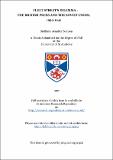Fleet Street's dilemma : the British press and the Soviet Union, 1933-1941
Abstract
British press opinion concerning the Soviet Union in the 1930s contributes to an understanding of the failed cooperation, prior to 1941, between the British and Soviet Governments. During the trial of six British engineers in Moscow in 1933, the conservative press jingoistically responded by demanding stringent economic action against the Soviet Union and possibly severing diplomatic cooperation. The liberal and labour press expected relations to improve to prevent similar trials of Britons in the future. Despite the strain in relations and ideological differences, between 1934 and 1935, Britain and the USSR worked for collective security. The quality conservative press was willing to support a closer relationship, though popular conservative newspapers remained anti-Soviet. The liberal and labour press, though hoping for more, expressed relief that Britain was improving relations with the Soviet Union. The Spanish Civil War led the conservative press to resume its non-collective beliefs and to become ideologically critical of the Soviet Union. The provincial conservative newspapers were the exceptions. Liberal and labour papers were annoyed with the British refusal to cooperate with the USSR over Spain and became disappointed by the Government's decision to support appeasement rather than collective action. While the British Government reviewed the benefits of collective security, the Moscow show trials damaged Britain's belief in the stability of the USSR. All papers realised there was something seriously wrong in the Soviet Union. The conservative press advocated avoiding cooperation with a country weakened by purging. The liberal and labour press, though concerned about the image of the USSR, realised that Britain required an East European ally and called for an improvement of existing relations. In 1939 nearly every newspaper demanded the British Government form an alliance with the USSR against Hitler's aggression and criticised both governments for wasting time. Condemnation of the Soviet Union's signing of the Nazi-Soviet pact and role in the partition of Poland was relatively limited as hope remained that Britain and the USSR would collaborate to defeat Hitler. However, the Winter War strained these hopes and led to intense press condemnation of the Soviet attack on Finland. Nevertheless, in July 1940 newspapers became interested in the emerging conflict of interests between Germany and the USSR. Despite criticism of Soviet expansion in Eastern Europe, the press accepted that Britain's security depended on the Soviet Union. All newspapers welcomed the alliance in 1941 and ignored ideological issues.
Type
Thesis
Collections
Items in the St Andrews Research Repository are protected by copyright, with all rights reserved, unless otherwise indicated.

